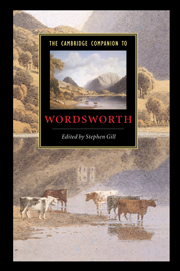Book contents
- Frontmatter
- Introduction
- 1 Wordsworth: the shape of the poetic career
- 2 Wordsworth's poetry to 1798
- 3 Poetry 1798-1807
- 4 'The noble living and the noble dead'
- 5 Wordsworth and The Recluse
- 6 Wordsworth and the meaning of taste
- 7 Wordsworth's craft
- 8 Gender and domesticity
- 9 The philosophic poet
- 10 Wordsworth and Coleridge
- 11 Wordsworth and the natural world
- 12 Politics, history, and Wordsworth's poems
- 13 Wordsworth and Romanticism
- 14 Wordsworth and America
- 15 Textual issues and a guide to further reading
- Index
- Series List
11 - Wordsworth and the natural world
Published online by Cambridge University Press: 28 May 2006
- Frontmatter
- Introduction
- 1 Wordsworth: the shape of the poetic career
- 2 Wordsworth's poetry to 1798
- 3 Poetry 1798-1807
- 4 'The noble living and the noble dead'
- 5 Wordsworth and The Recluse
- 6 Wordsworth and the meaning of taste
- 7 Wordsworth's craft
- 8 Gender and domesticity
- 9 The philosophic poet
- 10 Wordsworth and Coleridge
- 11 Wordsworth and the natural world
- 12 Politics, history, and Wordsworth's poems
- 13 Wordsworth and Romanticism
- 14 Wordsworth and America
- 15 Textual issues and a guide to further reading
- Index
- Series List
Summary
In 1921, David Nichol Smith described Wordsworth as 'our greatest nature poet' and it is a judgement many would still accept. The poem generally called 'Daffodils' ('I wandered lonely as a cloud'), like Kipling's 'If', is one of the last remaining genuinely popular poems. From it, one gains an image of Wordsworth as someone sustained and cheered by the flowers he finds when walking among the dales and hills. In other words, Wordsworth's natural world seems to be restricted to the country - implicitly denying that urban life is 'natural' - and, secondly, Wordsworth is seen as emotionally nourished by attractive, rural objects. This example of his nature poetry is easily aligned with pastoral and, at the same time, it seems to support a tourist's or holidaymaker's experience of the countryside.
‘Nature’ in this context means, roughly speaking, the non-urban or rural and this meaning of the word now predominates (partly because of the way in which Wordsworth was understood by his Victorian readers). When celebrating Wordsworth as a nature poet, it is easy to assume he is no more than a spokesperson for rural values or for the National Trust, the society established in the late nineteenth century for the preservation of the finest of the English landscape, amongst the founders of which were many admirers of his poetry. It is easy, in other words, to forget that in Wordsworth’s day ‘Nature’ was a term continuously employed in profound theological, philosophical, and political debates. Nature could be seen as brutal or as a harmonious system reflecting the perfect order of its creator or as the world of the heart not the head – as a realm of intuitions and affections which counterbalanced the overly strict dictates of reason. Each of these readings could be employed in support of different political positions: natural brutality justifies an oppressive tyranny, natural harmony reflects not only God’s order but the settled order of the established state, and natural feeling encourages the rebel to believe that his or her impulse of defiance is right.
- Type
- Chapter
- Information
- The Cambridge Companion to Wordsworth , pp. 180 - 195Publisher: Cambridge University PressPrint publication year: 2003
- 5
- Cited by



